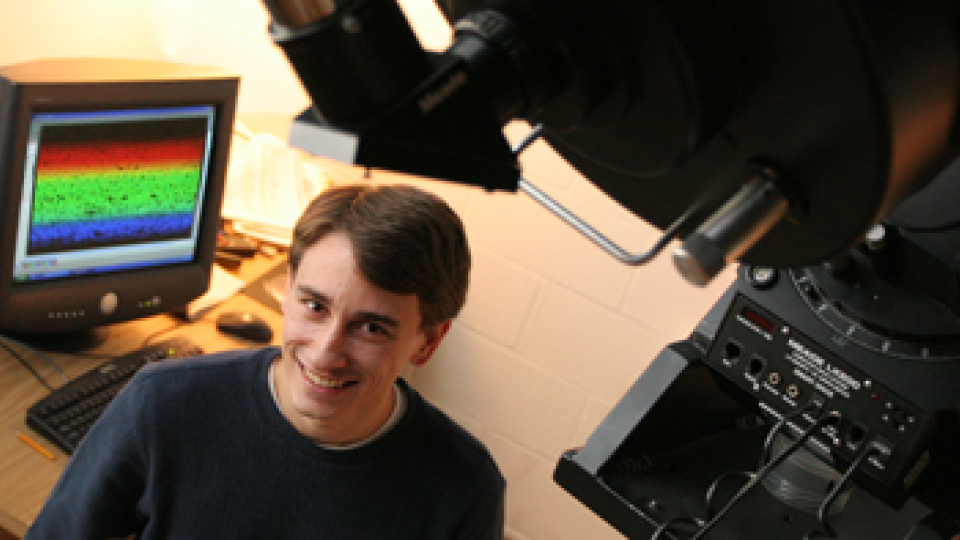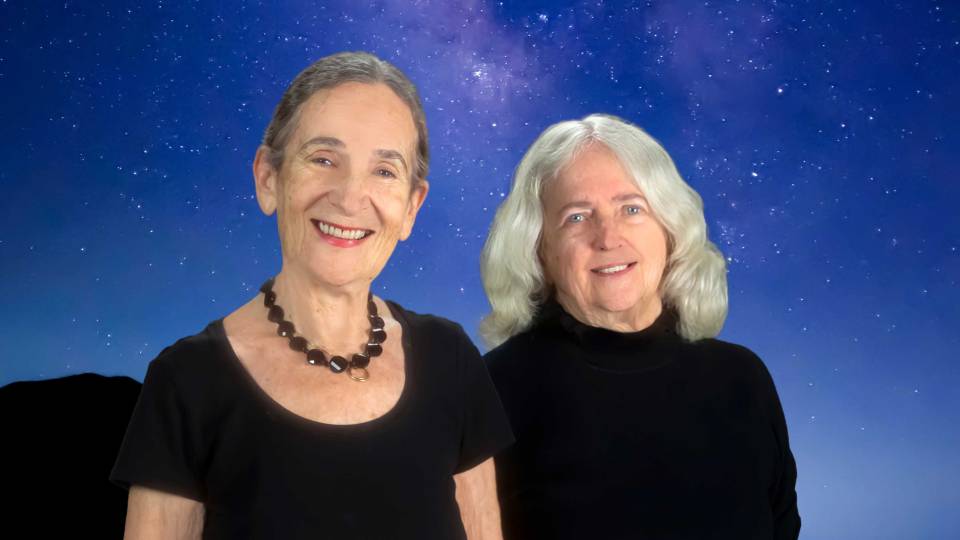From the April 24, 2006, Princeton Weekly Bulletin
Christopher Chyba readily admits that there is little apparent common ground between his two career tracks: astrophysics and international policy studies. Over the years, his diverse interests have led to some unusual tasks, including calculating the saltiness of an ocean on one of Jupiter’s moons and drafting the Clinton administration’s response strategy for infectious diseases.
As unrelated as these interests seem, Chyba has carved out a career that marries the two, balancing his commitments in both worlds.
Chyba joined the faculty in July as a professor of astrophysics and international affairs, with teaching and research responsibilities in both the Department of Astrophysical Sciences and the Woodrow Wilson School of Public and International Affairs. Eventually, he also will direct the school’s Program on Science and Global Security.
A graduate of Swarthmore College in physics, Chyba earned a second bachelor’s degree and a master’s degree in mathematical physics as well as a master’s degree in history and philosophy of science from Cambridge University as a Marshall Scholar. He was awarded a Ph.D. in astronomy from Cornell University in 1991.
Chyba then held several positions in the federal government before returning to academia. He was a White House Fellow and served as director for international environmental affairs with the National Security Council. He also worked in the White House Office of Science and Technology as energy liaison and as a consultant.
From 1996 to 1998, he taught in the Department of Planetary Science at the University of Arizona, then moved to the SETI Institute and Stanford University, where he was a faculty member in the Department of Geological and Environmental Sciences and co-director of the Center for International Security and Cooperation.
In 2001, the MacArthur Foundation awarded Chyba one of its “genius grants,” citing his “passion for understanding life on Earth and for protecting human civilization from self-destruction,” as well as his work focusing on “the relationship between preparing for biological terrorism and improving public health.”
Chyba recently discussed his career, his research and his goals at Princeton.
Your interests range from the origins of life on other planets to policy studies involving everything from nuclear arms proliferation to managing the rapid explosion of biotechnology. How did you become interested in so many questions?
I was studying theoretical physics at Cambridge University, and I noticed that I started spending all my time in the origins of life section of the bookstore. I was becoming very specialized in something that was enormously beautiful. But there were all these other things I cared about, and I wasn’t able to spend much time with them.
So I decided that if I wanted to study issues involving the origins of life, the way to do that with a physics background was through what’s now called astrobiology. There were very few people working in it [in the 1980s], and one of them was Carl Sagan at Cornell University.
I wound up going to Cornell to work with Carl, because it was clear that he had combined biology and chemistry with astronomy and planetary science. I want to emphasize that I knew essentially nothing about any of those fields. I had never taken an astronomy course as an undergraduate. I barely knew what a planet was. I had some biology in my background and some chemistry, but that’s exactly one of the things that was so appealing to me: I was going to get to learn something about all of those things.
Were you interested in science as a kid?
I didn’t grow up intending to be an astronomer by any means. In fact, it wasn’t one of my particular interests as a child, but I was always interested in science. I guess like a lot of children, I was especially interested in dinosaurs. How can you not be interested in dinosaurs?
I was a young child in the ’60s, and I think there was a different view of scientists then, especially early on. The TV movies I watched often portrayed scientists as people who understood the world and who also had a positive impact on the world.
I think I absorbed that image of what scientists could be — people who understood potentially important and profound things about the world, but also, because of that understanding, had an opportunity to contribute to it to make things better. I think it’s harder to find those kinds of images of scientists in the media now.
How did public policy come into the mix?
I had a longstanding interest in international affairs, maybe not as old as my interest in science and dinosaurs, but certainly by late grade school. And I did my senior thesis in political science as an undergrad.
The White House Fellowship [a prestigious program that offers people early in their careers experience working at the highest levels of the federal government] introduced me to international security first hand. I wrote an options paper for the deputy cabinet secretaries; I wound up chairing the inter-agency group that drafted the U.S. response strategy for emerging infectious diseases. I wrote the options paper that was used to decide policy with respect to shutting down the remaining reactors at the Chernobyl site. The White House fellowship catapults you into a host of issues.
What are your major areas of research at the moment?
You’re catching me at a time when I have just finished several big projects. So I have the luxury of sitting back a little bit and thinking, “Where do I really want to go next?”
On the policy side, my work mainly involves nuclear weapons or biological weapons, proliferation and terrorism. And I do that kind of work in different ways. I serve on committees at the National Academy of Sciences relevant to both those areas. I occasionally work with the staff on Capitol Hill. I’ve just been involved with the Global Pathogen Surveillance Act, which is primarily driven by efforts to improve international disease surveillance and response, but clearly also has a biological terrorism connection.
I’m interested in what the role of U.S. nuclear weapons is now and what the implications are for what kind of arsenal we ought to have. In 2012, we’ll still have around 2,000 strategic warheads. Does that number make sense? And what should we be doing with respect to nuclear proliferation — a very broad topic with lots of important questions to address.
And then in the biological realm, other than continuing to improve disease response, the most pressing issue is the implication of the biotechnology explosion, which is rapidly placing increased power into the hands of smaller groups of the technically competent. That presents a really different dilemma than the Cold War dilemma because, in the case of nuclear weapons, the technologies were few, more easily controlled and required large facilities.
In biology, none of that’s necessarily true. It’s getting exponentially less expensive and more available to people who are merely competent to do things that are potentially extremely dangerous. We don’t have good models from Cold War arms control for how we’re going to deal with that world.
Will you be teaching courses on these topics?
At the Woodrow Wilson School, I’m teaching a six-week seminar on the North Korean nuclear weapons program and the U.S. policy response. The plan for next year is still being thought through.
I’m not a regional expert. The reason that I have something to contribute is because I can bring the technical background with respect to the requirements for a nuclear weapons program — and present that, I hope, to the students in a way that will enlighten them about what’s happening and what our options are even if they aren’t scientists or engineers.
And what kind of research are you pursuing on the astrobiology side?
Our research continues to focus on Europa, which is one of Jupiter’s moons where we have the best evidence for another ocean off of the Earth. This ocean is 100 kilometers deep underneath maybe 10 kilometers of ice on a world the size of our moon, which means the volume of the ocean is about twice that of the Earth’s oceans.
Kevin Hand [a Stanford graduate student now with an office in the Princeton astrophysics department] and I are looking at a number of questions. We’re trying to understand the ocean better on the basis of spacecraft data. We have a paper that we’re about to submit on the salt content of Europa’s ocean, which has ramifications on how thick the ice might be and potential astrobiological implications for life.
Also, I’m just finishing chairing a National Research Council group called the Committee on Preventing the Forward Contamination of Mars. The U.S. is bound by the Outer Space Treaty, plus decades of precedent, to try to avoid carrying microorganisms on our spacecraft to Mars that could then, possibly, contaminate Mars and interfere with the very life detection experiments that we and other countries want to perform. And the point of this study was to ask, given what we’ve learned about Mars and about the ability of bacteria to survive in extreme environments on Earth, should we revise our current policies for how clean our spacecraft have to be and the way we clean them — or not? And if we should revise them, what should we do?
Mars is slowly looking potentially more habitable for living organisms. There’s a frequent launch program, so we’re sending all kinds of stuff there now. And we’ve learned that microorganisms on Earth can survive in really harsh environments. We know that plenty of microorganisms can survive a year in space if they’re shielded from the sun’s ultraviolet light. A set of things have come together that suggests that this problem might be more important and more difficult than had been appreciated.
What do you hope to accomplish here at Princeton?
This year at the Woodrow Wilson School, I co-directed the Program on Science and Global Security, and I will become director of that program next year or the year after. One goal I have is to further the integration of that program with the rest of the school, in particular with international securities studies. The program is largely a group of scientists who do technical analysis of important security issues: nuclear issues, biological issues, sometimes others. I would like to see that expertise even better integrated in the Wilson School than it currently is.
Also, there’s a huge interest in astrobiology on the part of Princeton undergraduates. But in the graduate program, we’re still just sort of feeling our way with this topic. So one thing I’d like to do is help the department decide what kind of astrobiology department we ought to be.
One thing that is exciting to me at Princeton is that I’m in an
astrophysics department again. There’s all this really cool astrophysics that I
haven’t spent much time with at all. Now, I’m getting to start seeing it again,
and that’s just fun. But in the meantime, there are so many international
security issues I want to stay on top of, and the Wilson School is one of the
best places in the world for doing that.



